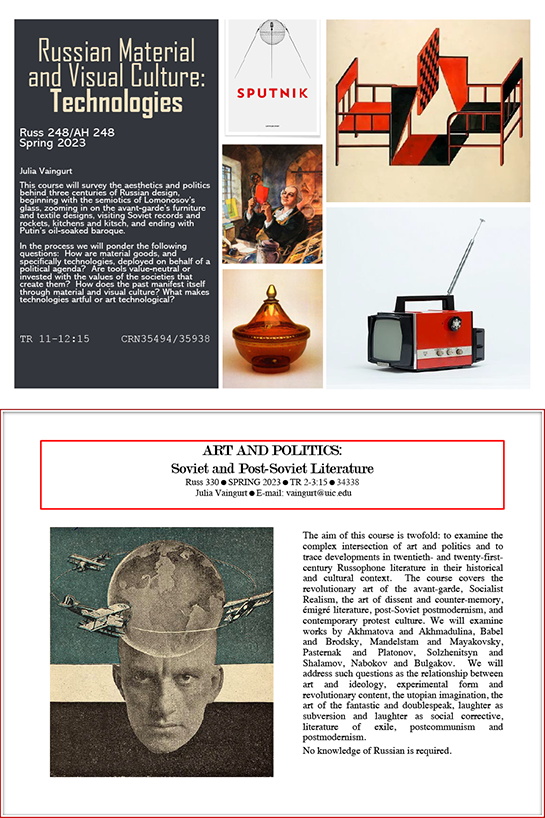Spring 2023 Russian Course Descriptions
Introduction
This is an unofficial list of courses that will be offered in Russian Studies in Spring 2023. It is strictly for the use of expanded course descriptions. For the complete official course offerings, please consult the My.UIC portal.
For a list of all courses and general course descriptions, please see the UIC Academic Catalog.
Spring 2023 Courses in Russian Language
All classes will meet Mondays and Friday on campus and Friday online synchronously. Additionally additional online asynchronous work is required for the 4th credit hour of the 100-level classes.
RUSS 102 – Elementary Russian II
- MWF 10:00-10:50 – Petrenko
- MWF 11:00-11:50 – Peremitina
RUSS 104 – Intermediate Russian II
- MWF 10:00-10:50 – Mitroshenkov
RUSS 201 – Advanced Russian through Media and Film
- MWF 11:00-11:50 – Zemenkov
Spring 2023 Russian & Central and Eastern European Studies Courses in English

RUSS 116 – Russian Culture: The Soviet Period
On Campus, MWF 12:00-12:50
Instructor: Brian Zdancewicz
World Cultures
RUSS 150 – Introduction to Russian Cinema
On Campus, MWF 2:00-2:50
Instructor: Dr. Matthew Kendall
Creative Arts; World Cultures
CEES 225 – Introduction to Central and Eastern European Cultures
On Campus, TR 9:30-10:45
Instructor: Dr. Michał Markowski
RUSS/AH 248 – Russian Visual and Material Culture: Technologies
On Campus, TR 11:00-12:15
Instructor: Dr. Julia Vaingurt
This course will survey the aesthetics and politics behind three centuries of Russian design, beginning with the semiotics of Lomonosov’s glass, zooming in on the avant garde’s furniture and textile designs, visiting Soviet records and rockets, kitchens and kitsch, and ending with Putin’s oil soaked baroque. In the process we will ponder the following questions: How are material goods, and specifically technologies, deployed on behalf of a political agenda? Are tools value neutral or invested with the values of the societies that create them? How does the past manifest itself through material and visual culture? What makes technologies artful or art technological?
Creative Arts
printable flyer
RUSS 330 – Art and Politics: Soviet and Post-Soviet Literature
On Campus, TR 2:00-3:15
Instructor: Dr. Julia Vaingurt
The aim of this course is twofold: to examine the complex intersection of art and politics and to trace developments in twentieth- and twenty-first century Russophone literature in their historical and cultural context. The course covers the revolutionary art of the avant-garde, Socialist Realism, the art of dissent and counter-memory, émigré literature, post-Soviet postmodernism, and contemporary protest culture. We will examine works by Akhmatova and Akhmadulina, Babel and Brodsky, Mandelstam and Mayakovsky, Pasternak and Platonov, Solzhenitsyn and Shalamov, Nabokov and Bulgakov. We will address such questions as the relationship between art and ideology, experimental form and revolutionary content, the utopian imagination, the art of the fantastic and doublespeak, laughter as subversion and laughter as social corrective, literature of exile, postcommunism and postmodernism.
No knowledge of Russian is required.
printable flyer
CEES/LING/LCSL 406 – History of European Standard Languages
On Campus, T 3:30-6:00
Instructor: Dr. Giedrius Subačius
If “a language is a dialect with an army and a navy,” then among the many dialects that make up a language, the standard variety has the largest military. This course is all about the phenomenon of “standard languages.” The standard variety is primarily written with the goal of providing linguistic uniformity in the face of social diversity. Standard languages are often thought of as prestigious, “most beautiful,” and may serve as a symbol of national identity while also being the official language of a country. We will analyze and discuss the “birth” and development of language standards, the development of individual standard languages, and we will see emerging historical–theoretical patterns. Some standards were initiated by kings, others—by intellectuals of peasant origin. Of over 50 present standard languages in Europe a number will be investigated, compared, and classified: English, Russian, German, Greek, Yiddish, Italian, French, Spanish, Lithuanian, Polish, Ukrainian, Norwegian, Croatian, Serbian, Luxembourgish, Albanian, Estonian, etc.
printable flyer
RUSS 440 – Topics in Russian Culture and Cultural Studies
On Campus, M 6:00-8:30
Instructor: Dr. Matthew Kendall
This course explores the history of the idea of documentary in 19th-, 20th-, and 21st-century Russia. We will explore how new forms of media and reportage like print journalism, photography, and sound recording produced an effect of documentation, and how this effect appeared in both expected and unexpected artistic contexts. Throughout the semester, class discussions will explore relationships between representation and reportage, fact and fiction, and sincerity and performance; all the while, we will ask what may have been unique (or not unique) about these categories in Russia.
CEES 550 – Critical and Theoretical Approaches to Cultural Production in Central and Eastern Europe: “Theological Origins of the Contemporary Critical Discourse”
On Campus, W 6:00-8:30
Instructor: Dr. Michał Markowski
The central thesis of Carl Schmitt’s political theology maintains that the main concepts in the political discourse of modernity are just secularized theological notions. This approach, as valid as it is, needs a radical expansion beyond the issue of sovereignty, to which it usually is reduced.
The seminar will propose that most of the contemporary critical vocabulary was designed either as a continuation or, most often, a negation of the basic theological concepts based on Christian theology established by Saint Paul. A derivative thesis of the seminar states that without a clear understanding of that basis, not only does the Christian-based culture and literature remain incomprehensible, but also its secular counterpart keeps obscuring its origins. To come to terms with those imbrications and to enlarge the critical vocabulary of the students, the seminar will offer a close and critical reading of Paul’s texts in vernacular languages (English, Russian, German, Spanish, French, and, if necessary, Polish) with the constant reference to the classical versions adopted by different churches (Greek and Latin). The differences between Catholicism, Protestantism, and Orthodoxy will also be discussed.
The seminar aims to create a multicultural, multilingual critical milieu to acknowledge and discuss this part of the modern tradition that has been largely ignored or insufficiently reflected upon among modern scholars.